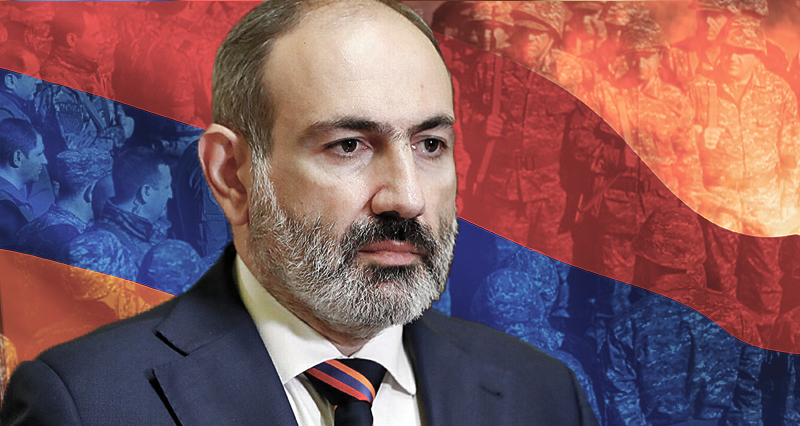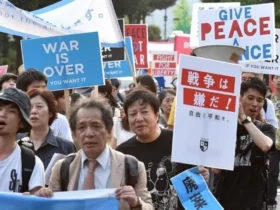The events in the South Caucasus and the recent coup attempt in Armenia cannot be understood in the framework of the past. The process is advancing very fast, and conditions and sides are changing very fast too. A new point of view and new tactics sometimes become necessary from one day to the other.
We have examined the developments in Karabakh in detail in our previous articles. The reader can track the development from the 90s till today in these articles.
These articles provide a basis to comment on the recent coup attempt in Armenia, but they are not sufficient, because the situation has changed right now.
Nikol Pashinian before and after the 10th of November
The evaluation of the Pashinian Government in Armenia has to differentiate between two periods: The first is the time till the ceasefire of November 10, 2020; the second is the phase after the ceasefire.
Before November 10, there was a Pashinian Government that came to power with a colored revolution supported by the West. As the President of Azerbaijan, Aliyev has formulated, “the children of Soros”, in other words, the Atlantic Front was behind the Pashinian government. This condition of the Pashinian government inevitably was leading to policies against Russia, Turkey and Azerbaijan. Therefore, the Armenian government was positioned in the hostile camp against all three of these countries, finally entering an outright war with Azerbaijan.
But following the signing of the ceasefire agreement on November 10, and also in result of the heavy defeat in the war, the Eriwan Government moved to a comparatively reasonable position and started to fulfill its obligations resulting from the ceasefire agreement as well as its responsibilities towards the Baku Government. At the same time, Pashinian started to take a relatively mild position towards Turkey and Azerbaijan.
For instance, when borders were drawn in the Syunik Region, Azerbaijan received the territories it deserved from the Pashinian Government without any problem. Hell brake out inside Armenia in part following also this agreement. Aliyev also has changed his stance towards Pashinian in this process. He even stated sometimes that Pashinian could not be held responsible alone, thus defending him against his competitors. Aliyev finally even expressed that a peace with Armenia as possible.
Being the negotiator and guaranteeing power of the ceasefire, Russia is today capable to make its voice heard in the Pashinian Government and control it in the sense of orderly proceeding effectively with the ceasefire agreement.
The opposition looking for revenge
In contrast to Pashinian, the opposition and the military take a much more hostile stance against Turkey and Azerbaijan. They even accuse Pashinian of capitulation to Turkey and Azerbaijan. Those forces that have led the coup attempt and that have organized the protests in the street call Pashinian and his supporters “Turkish rats” and “Turkish bastards”.
Causing problems for the ceasefire process
For this reason, a possible change of power in Eriwan will carry a segment to government that is much more hostile towards Turkey and Azerbaijan, and this may damage the ceasefire process, as there are still unsolved problems: The process of transferring the region of Khankendi/Stepanakert, from the currently controlling separatists to Azerbaijan or the return of Azeri emigrants to Karabakh, to begin with, still need resolution.
Therefore, if in Armenia a force comes to power that is outright hostile against Turkey and Azerbaijan, than the necessary steps for the solution of these problems may be endangered.
This kind of change of power will lead to negative consequences also from the point of view of Russia. Currently, Moscow is the guarantor state of the ceasefire. If the ceasefire process is interrupted or damaged, than will Russia lose prestige and initiative in the South Caucasus, and face new problems in its relations with Turkey and Azerbaijan.
Interests of the West converge with the opposition
Without any doubt were Soros and Western powers behind the Pashinian government formerly, but today, the “hawks” in the opposition represent the Western forces’ interests. This is due to the fact that the status quo benefits Ankara, Baku and Moscow. The Minsk Group is fully excluded and the political initiative is totally in the hands of the governments of the region. The West almost fully lost influence in the South Caucasus. The Atlantic Camp can only intervene in the region if the current status quo, stability and the regional initiative are interrupted.
In short, the US and France benefit from every development that damages the ceasefire process. Therefore, Azerbaijan, Russia and Turkey prefer Pashinian to stay in power for some more time.
“The revanchist line would be Armenia’s suicide”
Russia of course wanted to get rid of Pashinian, who was brought to power by the Atlantic network. Moscow’s plans included the elimination of Pashinian from power following his defeat in the Karabakh War. But in the circumstances evolved after the ceasefire of November 10, it as acknowledged that the current political process will be carried forward easier with Pashinian, who gave up resistance, than with the hawks in the opposition and the representatives of the Karabakh Clan.
And Russian President Putin stated this point of view openly. He pointed to the importance of Pashinian continuing in government after November 10, and he emphasized that a revanchist line would be Armenia’s suicide.
The Opposition seeks to repeat Pashinian’s mistakes
The interests of the Armenian people lead to the same result. There is naturally criticism against Pashinian. His Western supported policies led the country to destruction. But former governments have also responsibility in the current situation. Additionally, today Pashinian displays more a line of compromise with neighbors, at least. He indicates that he is capable of learning from the past.
The opposition’s and coup-organizers do not intend to learn from the past but to repeat the same mistakes, in other words, to lead Armenia to another adventure. However, although the opposition and the military act in revanchist intentions, it is obvious that they don’t have sufficient power to start a new war. But it is very clear and obvious that they will intent to sabotage the process of advancing the ceasefire and establishing Azerbaijan’s territorial integrity, as they also will try to impede Armenia’s integration into the regional initiative that develops under the leadership of Ankara, Moscow and Baku.
Not the countries of the region but the West benefits from the coup
In consequence, this coup attempt disturbed all, Turkey, Azerbaijan and Russia too. The hawks’ reach for government also aims to reject the 3+3 (6-Countries-Plattform), proposed by Aliyev and Erdoğan. Turkey, Russia and Iran had gained with this proposal the initiative and eliminated Western intervention.
The West will loose all hope if Armenia joins this proposal. This process can only be interrupted by hostility towards Turkey and Azerbaijan. For that reason, the coup attempt serves only the interests of the West, and not the countries of the region. The current oppositional position that Putin called “revanchist line” prepares to replace the compromise-seeking Pashinian.
The “Iskander-Plans” of the Armenian military
The Armenian military acted cleverly in this act. It made its move right after the day when the debate on Iskander Missiles erupted. The debate had caused negative reactions in Moscow against Pashinian, and it seems pretty clear that the Armenian military tried to gain the Kremlin’s support using that reaction. But the Armenian military did not get what it hoped for.
Meanwhile, the Iskander missiles were not used in the Karabakh War, as Russian officials and Aliyev both confirmed. The Russian side emphasized that Pashinian was informed wrongly. But than the question is: Who provided Pashinian with this misinformation that would cause tensions with Moscow? Who misled him? Just a day after the misinformation, the military published the warning, calculating to gain Russian support. In this process, Pashinian once again demonstrated lack of statesmanship. Maybe he was trapped and forced to this error.
Russia did not support the coup
The Kremlin in spite of the affair did not support the coup, moreover, Moscow called for calm, emphasizing that the problem should be solved within the constitutional framework. The Russian public opinion interpreted tis declaration as a message to the Armenian military “not to leave the caserns”.
On the other hand, Putin, who had not responded for days to Pashinian’s phone calls when the Karabakh War started, has contacted the Armenian Prime Minister on the day of the coup attempt. It appears that lacking the support it had wished for, the military refrained from releasing the tanks and soldiers to the streets. Instead, it was forced to be content with publishing the memorandum.
Dual government
In consequence a situation of two governments or two centers of power has emerged in Armenia. Both, the call of the military to Pashinian to resign as well as the attempt of Pashinian to dismiss the Chief of Staff have not achieved any result. The opposition started protests on the streets, the supporters of Pashinian on the squares.
This situation of dual government, of dual power cannot continue. One side will eliminate the other. But Pashinian’s position has weakened, whatever the result will be. The commanders who have attempted the coup, on the other side, are still in charge and keep their arms.
How far can the hawks get?
It is worth emphasizing that, even if they prevail in this conflict, the hawks’ possibilities of action are limited. They cannot attempt to start a new war; they lack the necessary power and resources. The US and France have not enough influence and presence in the South Caucasus to support that purpose. And it seems very unlikely that the hawks take any steps to directly target and endanger Russia’s role as guarantor state.
But they might cause problems in the ceasefire process, and a situation prone to provocations will develop. That’ll be the day for Western intelligence agencies. Additionally, Armenia will lose time in joining the regional initiative and the revanchist discourse will gain strength. The country will face serious instabilities. The government of the hawks will harm foremost Armenia, before it causes problems for other countries.
Lesser evil
In summary: There is on the one side Pashinian; a Prime Minister who until November 10 was under the control of the Atlantic, before being abandoned and left alone, who currently works in relative harmony with his regional counterparts. On the other side are the Manukians; the sworn enemies of Turkey, who have governed Armenia for years and are responsible for its current situation, and the Karabakh Clan represented by the Kotscharians, who are knee-deep in corruption affairs, joined by the remnants of the Dashnaks and the ASALA.
Armenia still has not produced its own and true alternative for government. The country is condemned to choose the lesser evil.
The interests of Armenia and the Armenian people lie in establishing a government that pursues friendly relations with Turkey, Azerbaijan and Russia. The country’s deep economic, social and political problems, and its trauma after the suffered defeat can only be solved on this way.

















Leave a Reply